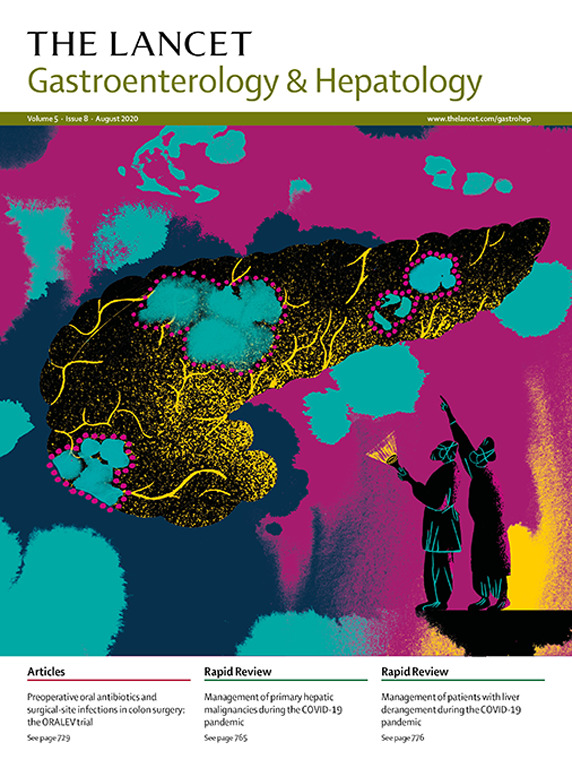Research in Brief
IF 38.6
1区 医学
Q1 GASTROENTEROLOGY & HEPATOLOGY
引用次数: 0
Abstract
Section snippets
Guselkumab for Crohn's disease
Guselkumab shows promise for adults with moderate-to-severe Crohn's disease, according to the GALAXI-2 and GALAXI-3 phase 3 trials. Remo Panaccione and colleagues randomly assigned patients to receive intravenous guselkumab 200 mg followed by subcutaneous guselkumab either at 200 mg every 4 weeks (n=299) or 100 mg every 8 weeks (n=297); intravenous ustekinumab followed by subcutaneous ustekinumab 90 mg every 8 weeks (n=300); or intravenous placebo (n=153). Those without a clinical response toDurvalumab for gastric cancer
Adding durvalumab to perioperative chemotherapy improves event-free survival (EFS) in patients with resectable gastric or gastro-oesophageal junction cancer, according to the MATTERHORN trial, in which Yelena Y Janjigian and colleagues randomly assigned patients to receive perioperative FLOT (fluorouracil, leucovorin, oxaliplatin, and docetaxel) plus durvalumab 1500 mg every 4 weeks (n=474) or FLOT plus placebo (n=474). Treatment included two preoperative and two postoperative cycles of FLOT,Robotic surgery for rectal cancer
Robotic surgery improves long-term outcomes for middle and low rectal cancer, according to results from the REAL trial. Qingyang Feng and colleagues randomly assigned patients with cT1–T3, N0–N1, or ycT1–T3 Nx rectal adenocarcinoma and no distant metastases to undergo either robotic (n=620) or conventional laparoscopic (n=620) rectal cancer resection. At median follow-up of 43 months, 3-year locoregional recurrence was 1·6% (95% CI 0·6–2·6) in the robotic group versus 4·0% (2·4–5·6) in theRetifanlimab for anal cancer
Retifanlimab added to first-line chemotherapy improves outcomes for patients with inoperable locally recurrent or metastatic squamous cell carcinoma of the anal canal, according to the POD1UM-303/InterAACT-2 phase 3 trial. Sheela Rao and colleagues randomly assigned patients to receive intravenous retifanlimab 500 mg (n=154) or placebo (n=154) every 4 weeks plus carboplatin–paclitaxel for up to a year. Median progression-free survival was 9·3 months (95% CI 7·5–11·3) in the retifanlimab groupColorectal cancer screening in adults aged 45–49 years
Default mailing of a faecal immunochemical test (FIT) was more effective than active choice outreach in promoting colorectal cancer screening among adults aged 45–49 years, according to new research. Artin Galoosian and colleagues randomly assigned average-risk primary care patients to receive either a FIT-only active choice invitation (n=5131), a colonoscopy-only active choice invitation (n=5127), a dual-modality active choice (FIT or colonoscopy; n=5125) invitation, or usual-care default研究简介
根据galaxy -2和galaxy -3的3期临床试验,guselkumab显示出治疗中度至重度克罗恩病的希望。Remo Panaccione及其同事随机分配患者接受静脉注射200毫克的谷瑟库单抗,随后皮下注射200毫克每4周(n=299)或100毫克每8周(n=297);静脉注射ustekinumab,随后每8周皮下注射ustekinumab 90mg (n=300);或静脉注射安慰剂(n=153)。在MATTERHORN试验中,Yelena Y Janjigian及其同事随机分配患者接受围手术期FLOT(氟尿嘧啶、亚叶酸钙、奥沙利铂和多西紫杉醇)+ durvalumab 1500 mg每4周(n=474)或FLOT +安慰剂(n=474),将durvalumab加入围手术期化疗可改善可切除胃癌或胃食管结癌患者的无事件生存期(EFS)。治疗包括术前和术后两个周期的FLOT,直肠癌机器人手术根据REAL试验的结果,机器人手术改善了中低位直肠癌的长期预后。Feng Qingyang及其同事随机分配cT1-T3、N0-N1或ycT1-T3 Nx直肠腺癌且无远处转移的患者接受机器人(n=620)或传统腹腔镜(n=620)直肠癌切除术。在中位随访43个月时,机器人组3年局部复发率为1.6% (95% CI为0.6 - 2.6),而替替利单抗组为4.0% (95% CI为2.4 - 5.6)。根据POD1UM-303/InterAACT-2 3期试验,替替利单抗加入一线化疗可改善无法手术的肛管局部复发或转移性鳞状细胞癌患者的预后。Sheela Rao和同事随机分配患者每4周接受静脉注射500毫克瑞替利单抗(n=154)或安慰剂(n=154),加卡铂-紫杉醇治疗长达一年。45-49岁成人结直肠癌筛查根据一项新的研究,在促进45-49岁成人结直肠癌筛查方面,默认邮寄粪便免疫化学试验(FIT)比主动选择外展更有效。Artin Galoosian及其同事随机分配平均风险的初级保健患者,接受仅FIT主动选择邀请(n=5131),仅结肠镜主动选择邀请(n=5127),双模式主动选择(FIT或结肠镜;n=5125)邀请或常规护理默认
本文章由计算机程序翻译,如有差异,请以英文原文为准。
求助全文
约1分钟内获得全文
求助全文
来源期刊

Lancet Gastroenterology & Hepatology
Medicine-Hepatology
CiteScore
50.30
自引率
1.10%
发文量
0
期刊介绍:
The Lancet Gastroenterology & Hepatology is an authoritative forum for key opinion leaders across medicine, government, and health systems to influence clinical practice, explore global policy, and inform constructive, positive change worldwide.
The Lancet Gastroenterology & Hepatology publishes papers that reflect the rich variety of ongoing clinical research in these fields, especially in the areas of inflammatory bowel diseases, NAFLD and NASH, functional gastrointestinal disorders, digestive cancers, and viral hepatitis.
 求助内容:
求助内容: 应助结果提醒方式:
应助结果提醒方式:


